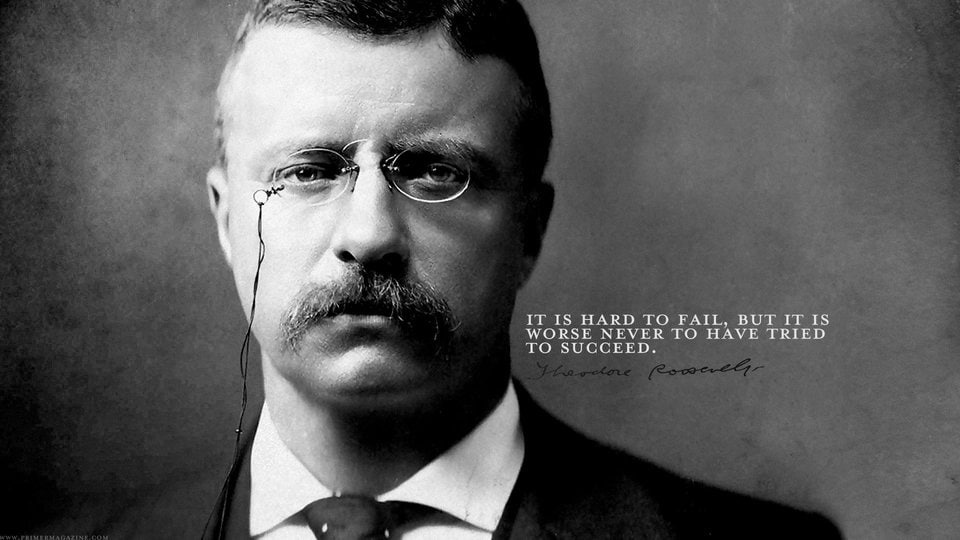The Theodore Roosevelt Guide To Productivity
by

One of the most productive leaders of the last century, Theodore “Teddy” Roosevelt has achieved almost mythical status for his various careers as a rancher, a soldier, and a politician—not to mention his achievements as a hunter and naturalist.
Due to severe asthma during his childhood, Roosevelt was homeschooled through high school. Despite his physical setbacks, however, Teddy studied hard and eventually attended Harvard University. During this time, he displayed particular ability as a historian, publishing his first book just two years after finishing college.
Following a short stint as a New York Assemblyman, he moved to the Dakotas where he operated a cattle ranch until 1886. Returning east, the future president took a position as the Assistant Secretary of the Navy. When the Spanish-American War broke out, however, he immediately resigned to lead a volunteer cavalry unit known as the Rough Riders.
Returning after the war, Theodore Roosevelt moved from Governor of New York to Vice President of the United States and, ultimately, to the Oval Office. As President, Roosevelt was responsible for the creation of the Panama Canal, the Great White Fleet, and the peaceful end of the Russo-Japanese War. After completing his second term, he declined to run again, instead setting out on a hunting safari in Africa and a tour of Europe. Following a nearly successful attempt to reenter politics, Roosevelt died at the age of 60 due to complications of malaria (which he had contracted while exploring South America).
So why did I tell you all of that? No, it’s not so I can quiz you on the life of a long-dead president. In my studies of Roosevelt’s life, I noticed more than just what he did, but how he did them. Afterall, he was responsible for more world-changing projects than most of us are on track to complete.
I think, by applying Roosevelt’s particular techniques for maximum productivity, even you and I can create a better, more productive life.
# 1 Focus on the Present
While Roosevelt pursued a number of vastly different careers, his consistent success was due largely to his ability to focus on the present. He ranched, he fought, and he politicked, but he only did one at a time.
By following this method of “serial excellence,” we too can accomplish great things in a variety of fields. While it is often tempting to do everything at once, you will be much more productive when you focus on one goal at a time.
# 2 Never Stop Learning
After graduating from Harvard University, many people would be tempted to rest on their laurels and be done with their education. Theodore Roosevelt, one the other hand, made learning a life habit. While enforcing the law on the windswept prairies of the Dakota Badlands, Sheriff Roosevelt carried a book to fill his spare moments. Even in the White House, President Roosevelt purportedly read an average of five books a week.
Rather than treating our education as a task to be completed, we should view it as a lifestyle to be followed. Completing college is a major accomplishment, but it is still but a milestone on the path to greater learning.
# 3 Take Risks
In retrospect, Roosevelt’s life looks like one big adventure, but we often overlook the risks he took. For instance, we all remember how his escapades with the Rough Riders propelled him to national fame, but do we remember the risk he took by resigning his promising position as Assistant Secretary of the Navy in exchange for a volunteer position fighting in the war he supported?
As you move through life, don’t let the lure of short-term security turn you from the long-term goal of greater success.
# 4 Don’t Sacrifice too Much
Unfortunately, no man is perfect, and Roosevelt is no exception. For all the encouragement we can draw from his life, he also provides one crucial lesson of warning. Like many great men, Theodore Roosevelt’s career success came at the expense of his family’s well-being. After his wife died, Roosevelt left his newborn daughter with relatives while running his cattle ranch. Later, while President, he jokingly admitted to a friend, “I can either run the country or I can attend to Alice, but I cannot possibly do both.”
Let us learn from this unfortunate example and remember to keep our priorities correct. Whether we are tempted to value career over family or simply to forgo a once-in-a-lifetime trip to Spain in order to study, we must never forget to live for more than our accomplishments.
If you enjoyed this post, you may also like “5 Big Lessons I Learned from America’s Smallest President.”